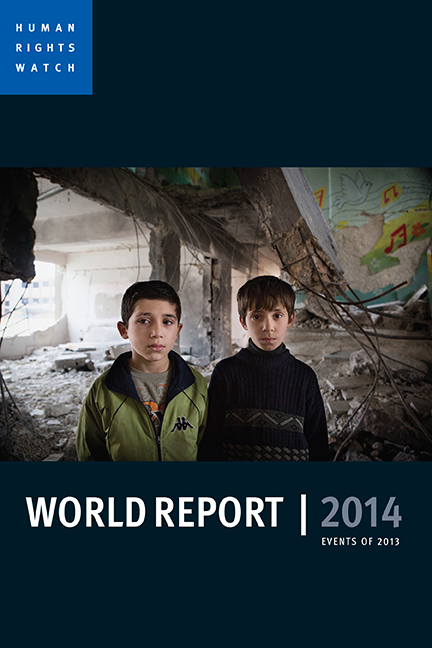Book contents
- Frontmatter
- Dedication
- HUMAN RIGHTS WATCH
- Table of Contents
- Foreword
- Rights Struggles of 2013: Stopping Mass Atrocities, Majority Bullying, and Abusive Counterterrorism
- The Human Rights Case for Drug Reform How Drug Criminalization Destroys Lives, Feeds Abuses, and Subverts the Rule of Law
- Putting Development to Rights: Integrating Rights into a Post-2015 Agenda
- The Right Whose Time Has Come (Again) Privacy in the Age of Surveillance
- Photo Essays
- AFRICA
- AMERICAS
- ASIA
- EUROPE AND CENTRAL ASIA
- MIDDLE EAST AND NORTH AFRICA
- UNITED STATES AND CANADA
- 2013 HUMAN RIGHTS WATCH PUBLICATIONS
- Acknowledgments
- Frontmatter
- Dedication
- HUMAN RIGHTS WATCH
- Table of Contents
- Foreword
- Rights Struggles of 2013: Stopping Mass Atrocities, Majority Bullying, and Abusive Counterterrorism
- The Human Rights Case for Drug Reform How Drug Criminalization Destroys Lives, Feeds Abuses, and Subverts the Rule of Law
- Putting Development to Rights: Integrating Rights into a Post-2015 Agenda
- The Right Whose Time Has Come (Again) Privacy in the Age of Surveillance
- Photo Essays
- AFRICA
- AMERICAS
- ASIA
- EUROPE AND CENTRAL ASIA
- MIDDLE EAST AND NORTH AFRICA
- UNITED STATES AND CANADA
- 2013 HUMAN RIGHTS WATCH PUBLICATIONS
- Acknowledgments
Summary
Eritrea is among the most closed countries in the world; human rights conditions remain dismal. Indefinite military service, torture, arbitrary detention, and severe restrictions on freedoms of expression, association, and religion provoke thousands of Eritreans to flee the country each month. Among those fleeing in 2013 were the minister of information—whose 85-year-old father, brother, and 15-year-old daughter were immediately arrested—and the deputy head of economic affairs of the People's Front for Democracy and Justice (PFDJ), Eritrea's sole political party that controls most major domestic commercial enterprises.
In October, more than 300 Eritrean refugees drowned when a boat bringing them to Europe capsized near Lampedusa, Italy. According to the United Nations High Commissioner for Refugees (UNHCR), over 305,000 Eritreans (more than 5 percent of the population) have fled during the past decade.
Eritrea has no constitution, functioning legislature, independent judiciary, elections, independent press, or nongovernmental organizations; it does not hold elections. All power is concentrated in the hands of President Isaias Afewerki, in office since 1991.
In a rare sign of domestic dissent, on January 21, 2013, a group of soldiers with tanks, led by a brigadier general and three colonels, briefly occupied the Ministry of Information (“Forto”) and forced the director of government television to read a statement demanding the release of political prisoners and implementation of the 1997 constitution. The transmission was cut after a few sentences and the protestors surrendered when other military units failed to deliver expected support. According to credible reports, 60 or more high-level alleged collaborators were arrested, several of whom are now dead, some by suicide. Among them is said to be Abdella Jaber, PFDJ's chief administrator.
Despite repeated requests, Eritrea denied the United Nation special rapporteur on Eritrea, Sheila Keetharuth, a visa. In a 2013 report based on refugee interviews, she concluded that “basic tenets of the rule of law are not respected.” Following her report, the Council “strongly condemn[ed]” Eritrea's “continued widespread and systematic violations of human rights and fundamental freedoms.”
Indefinite Conscription and Forced Labor
Eritrea conscripts all men and unmarried women into “national service.” Although Eritrean law limits national service to 18 months, most conscripts serve for much of their working lives.
- Type
- Chapter
- Information
- World Report 2014Events of 2013, pp. 113 - 118Publisher: Bristol University PressPrint publication year: 2014



